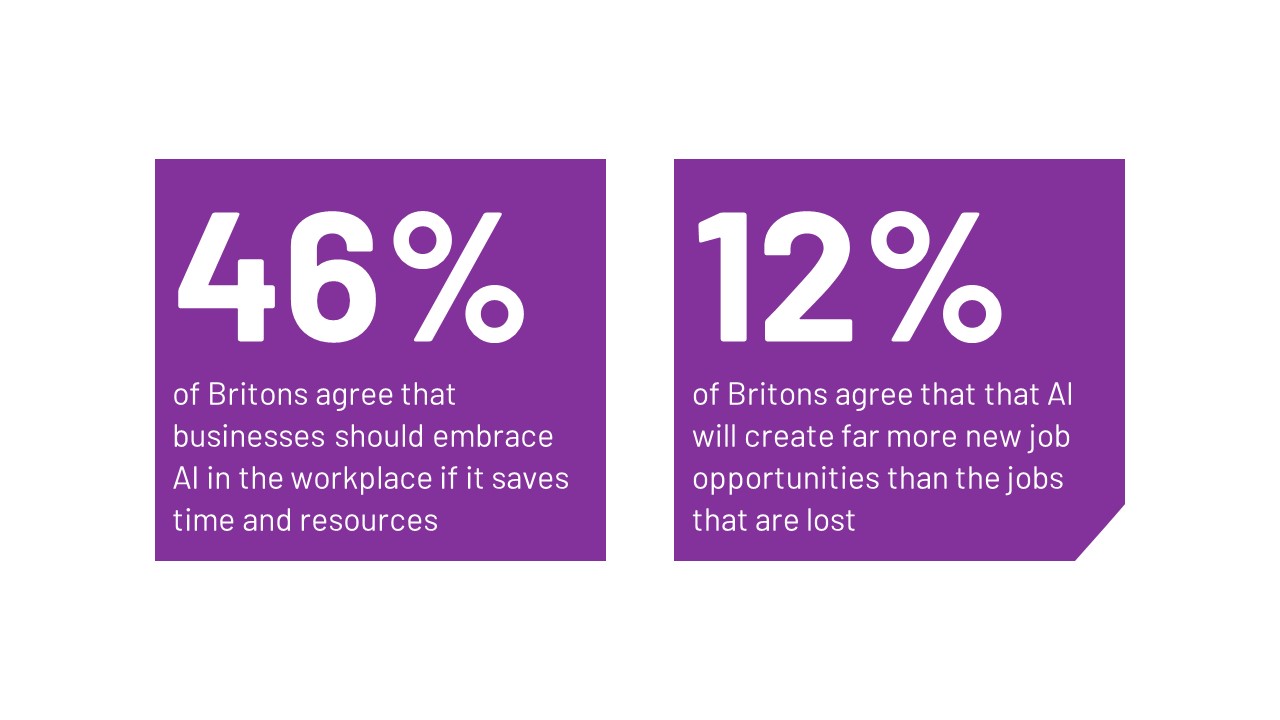UK workers seek new digital skills amidst the buzz of AI
Artificial intelligence (AI) is certainly not a new technology but developments in generative AI over 2023 made it one of the buzzwords of last year (Google Trends data suggests since it’s had an upward trend in popularity since November 2022 – although it did peak between April 23rd – 29th 2023). People in the UK aren’t just exploring the topic online – they’re also thinking about how this technology will impact their working lives.
Ipsos research finds that 2 in 3 (64%) Britons think AI will affect their job. However, there’s volatility on public opinion about whether the impact will be positive or not. While almost half (46%) agree that businesses should embrace AI in the workplace if it saves time and resources, there remains fear about workers being replaced by this technology. Only 12% believe that AI will create far more new job opportunities than the jobs that are lost. Further, graduates are more likely to believe AI will impact how they work – 62% of graduates believe their job will be affected by artificial intelligence 12 months from now, compared to 43% of non-graduates. The perceived impact varies, namely in the belief that it will help with some aspects of their job or causing their job to cease to exist.1

In light of these concerns, 53% of UK office workers want to learn new skills to prevent AI from replacing their role at work, despite only about 1 in 3 (34%) saying they have had the opportunity to learn about using AI at work. This suggests possible issues of these workers falling behind on having relevant abilities for their job and greater feelings of being left behind, despite employers having potential as a resource for learning.2
Assuming there will be increased adoption of AI in a range of job roles and embedded tech in every-day tasks, there needs to be harmony between AI in the workplace and workers future-proofing their jobs. To enable this, there should be upskilling in this technology to keep up with the shifts in necessary workplace skills. Data from EDS 2023 shows there is an appetite for learning. Amongst the UK labour force adults 18+, 40% are considering learning a new digital task for work and 16% are considering learning data analysis skills such as data science or AI. However, this consideration for improving digital capabilities drops with increased age and is currently greatly dependent by industry worked in – at a high of 65% in technology sector and a low of 24% for those employed in retail.3
Thus, as organisations recognise a need for their own AI strategy, it will be key to communicate how this has importance to the job roles of their employees. There’s an appetite to learn, and upskilling workers will improve the digital proficiency in the workplace. It may also improve understanding of how people can work with AI rather than be alienated or put at a disadvantage by the technology.
Attitudes towards AI at work - June 2023, available at https://www.ipsos.com/en-uk/majority-britons-support-government-regulation-of-ai-to-prevent-job-losses
State of Learning for UK Office Employees - May 2024, available at https://www.ipsos.com/en-uk/only-half-uk-workers-have-received-learning-opportunities-work-1-in-2-have-not-learned-about-ai
Essential Digital Skills 2023, available at https://www.ipsos.com/en-uk/uk-essential-digital-skills-2023
Technical Note:
Ipsos has been commissioned by Lloyds Banking Group to carry out the Essential Digital Skills (EDS) study for the past four years. This research measures the digital capability of the UK adult population across a range of skill areas, but also allows a look at other emerging themes in the UK related to technology. Ipsos interviewed 4,172 participants aged 18+ years in the UK (Great Britain and Northern Ireland) via their telephone Omnibus. Data are weighted to represent the UK population in terms of age, social grade, region and working status within the gender variable and additional profiles on tenure and ethnicity using PAMCo data. Data are further weighted on device ownership using data derived from a robust national survey.

